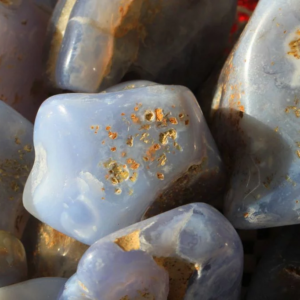zeolite
Zeolite refers to a group of naturally occurring and synthetic minerals known for their porous structure and versatile applications. These hydrated aluminosilicates of alkali or alkaline-earth metals are prized for their ability to absorb, filter, and catalyze due to their unique crystalline frameworks. Zeolites are used extensively in industrial processes, agriculture, water purification, and as collectors’ items in their natural crystalline forms.
Key Features of Zeolites:
- Composition and Structure:
- Chemical Composition: Zeolites are aluminum silicates with a framework of interconnected tetrahedra of SiO₄ and AlO₄.
- Framework: The structure contains large open spaces and channels, making zeolites highly porous.
- Hydration: Zeolites contain water molecules within their pores, which can be reversibly removed and reabsorbed.
- Physical Properties:
- Color: Varies widely, including white, yellow, green, pink, and blue, depending on impurities.
- Hardness: Typically soft to medium, with a Mohs hardness of 3.5–5.5.
- Luster: Often vitreous to pearly in appearance.
- Crystal System: Most zeolites belong to the monoclinic or orthorhombic crystal systems.
- Common Zeolite Varieties:
- Scolecite: Radiating crystals with calming energy.
- Heulandite: Known for its tabular crystals, often pale pink or green.
- Stilbite: Fan-shaped crystals, typically pearly white or peach-colored.
- Chabazite: Forms cubic or rhombohedral crystals, often in white or pale hues.
- Clinoptilolite: Widely used in water purification and agriculture.
- Sources:
- Found worldwide in volcanic rocks, particularly in regions like Iceland, India, Italy, United States, and Japan.
- Zeolite-rich deposits are commonly located near geothermal activity or where volcanic rocks have been altered by water.
- Industrial and Practical Uses:
- Water Filtration: Removes heavy metals, ammonium, and other pollutants from water.
- Agriculture: Used as a soil conditioner and to trap ammonia in animal waste management.
- Petroleum Industry: Acts as a catalyst in refining crude oil.
- Detergents: Replaces phosphates in eco-friendly detergents.
- Medical and Health: Clinoptilolite zeolite is sometimes marketed as a detoxifying agent, though claims require careful scrutiny.
- Metaphysical and Healing Properties:
- Detoxification: Believed to absorb negative energies, toxins, and electromagnetic pollution.
- Balance: Enhances mental clarity and emotional stability.
- Grounding: Connects the user with Earth’s energies, promoting a sense of rootedness.
- Symbolism:
- Purity and Cleansing: Represents the ability to filter and remove impurities, both physical and energetic.
- Support and Structure: Symbolizes stability and adaptability due to its resilient framework.
Care and Maintenance:
- Durability:
- Zeolites are relatively soft and can be scratched or chipped easily. Handle with care to preserve their crystalline structures.
- Cleaning:
- Clean gently with a soft brush and warm water. Avoid chemicals or acids, as zeolites are sensitive to pH changes.
- Storage:
- Store in a padded box or separate compartment to prevent damage to their fragile crystalline formations.
Rarity and Value:
- Abundance: Zeolites are geologically abundant, but high-quality, aesthetic specimens with vibrant colors and perfect crystal formations are rarer and more valuable.
- Collector Appeal: Specimens with unique formations, vibrant colors, or notable provenance can command higher prices.
Interesting Facts:
- “Boiling Stones”: Zeolites were historically referred to as “boiling stones” because they release water as steam when heated.
- Eco-Friendly: Zeolites are widely used in environmental applications due to their ability to adsorb pollutants and heavy metals.
- Pioneering Research: The discovery of synthetic zeolites revolutionized industries by providing customizable molecular sieves for specific applications.
How to Use Zeolites:
- Water Purification: Place zeolite granules in water filters to remove toxins and impurities.
- Spiritual Practices: Use zeolite clusters in meditation spaces for energetic cleansing and grounding.
- Soil Improvement: Mix zeolites into soil to enhance nutrient retention and drainage in gardens.
- Collection Display: Showcase natural zeolite specimens for their intricate beauty and unique crystallization patterns.
Would you like recommendations for zeolite varieties for specific uses, tips on acquiring high-quality specimens, or guidance on industrial applications?

Leave a Reply
Want to join the discussion?Feel free to contribute!